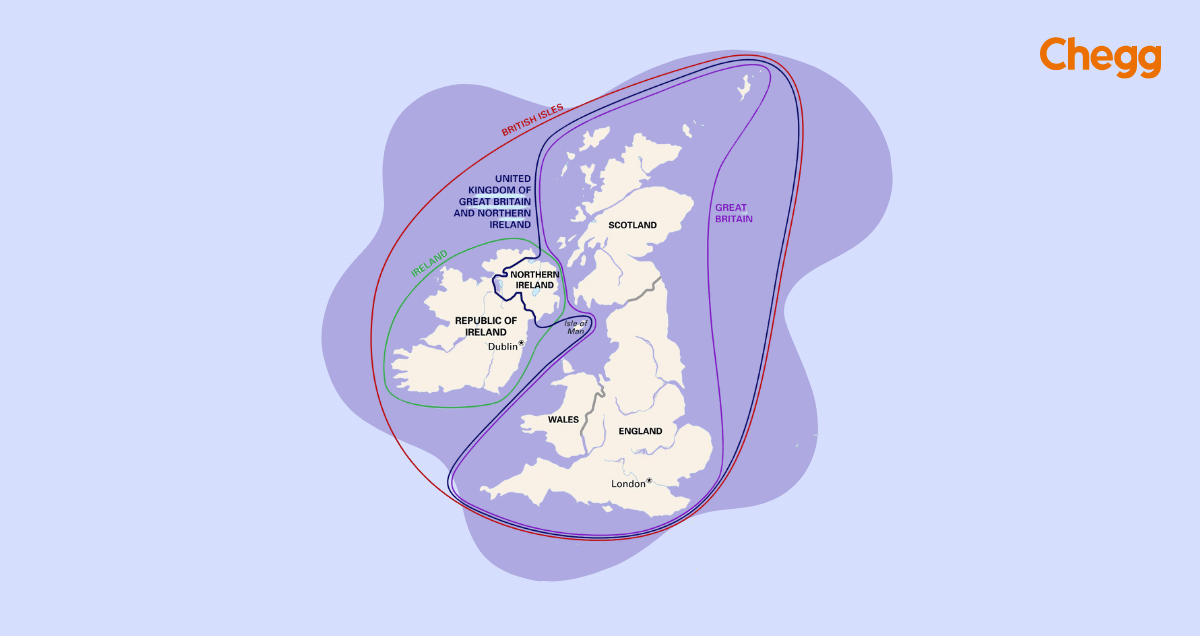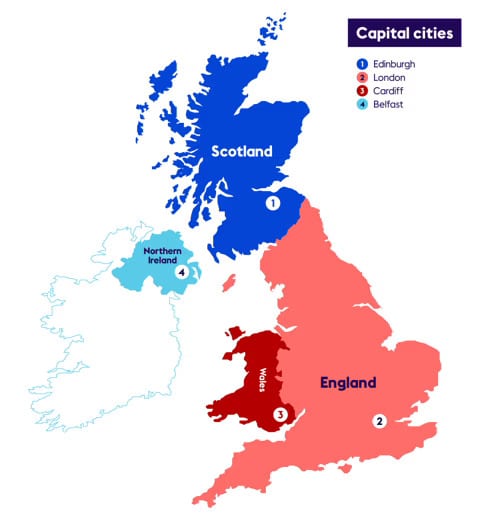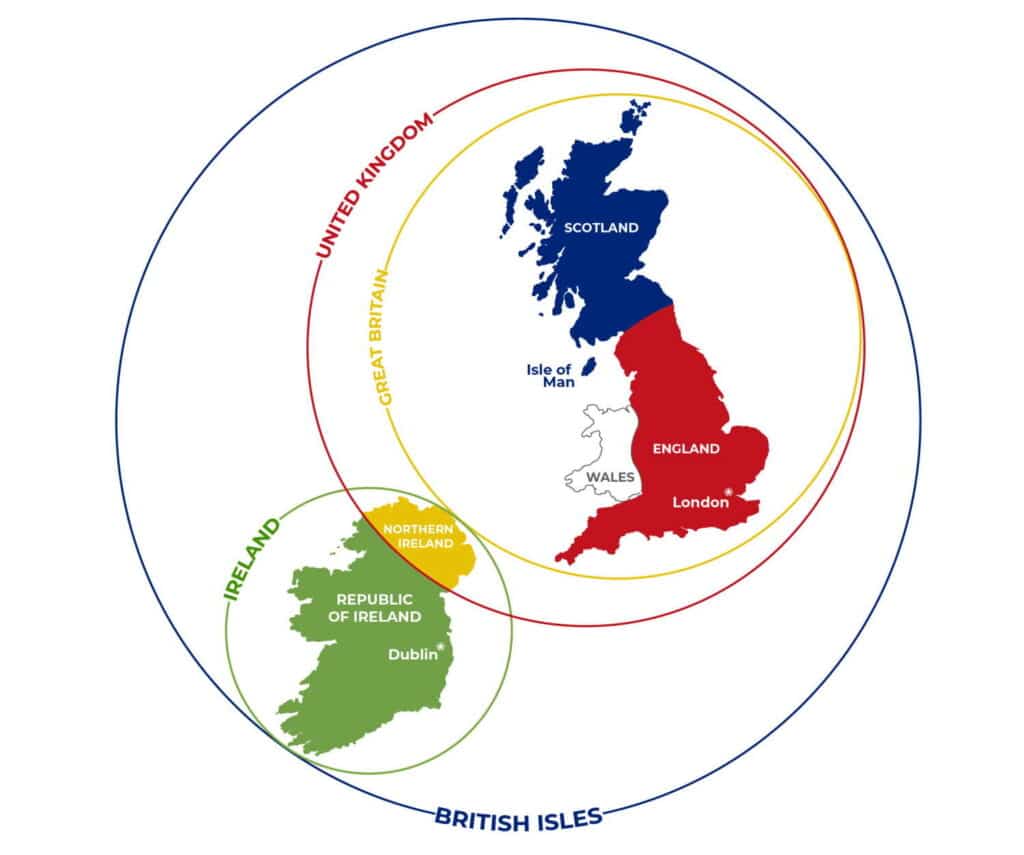Home » General Knowledge » The Difference Between England And Britain
The Difference Between England And Britain

Table of Contents
What Is England?

Definition
Difference between England and Britain? The England is rich in culture, history, and scenic beauty, situated between the British Isles’ untamed shoreline and undulating hills. England has undergone constant changes from its Celtic origins to its current position as a Worldwide Centre. It leaves an enduring impression on the international scene. The largest and busiest region in the United Kingdom is England. Tucked away in the southeast of the continent, this region is a cultural treasure trove and a Centre of vibrant cities in addition to being a visual feast with all of its breathtaking scenery.
Geographical Condition Of England
In Difference between England and Britain the England’s topography is a mesmerizing combination of spectacular peaks, lush valleys, and rolling hills. The Cotswolds represent the pinnacle of English rural appeal with its honey-colored stone cottages and quaint market towns. A UNESCO World Heritage site, the Lake District offers nature enthusiasts an enchanted retreat with its magnificent panorama of majestic mountains, beautiful lakes, and verdant woods. Charming towns hug the cliffs along the coast, and busy ports act as entry points to the outside world.
Political And Geographical Conditions And England’s Legacy
While we study the difference between England and Britain, it is also important to highlight the legacy of England. Many people began using the moniker “England” to refer to the entire island by the 14th century as a result of England’s established military and political supremacy in Britain. This change in language reflected England’s rising power, which caused the names of the other countries that call the island home Wales and Scotland do progressively disappear.
In the Difference between England and Britain, England is a thriving, dynamic country today, with new innovations weaved throughout its rich history. England’s cultural contributions which include music, art, and literature, as well as its technical superiority and worldwide economic sway continue to impact the world significantly. It is a place of tremendous beauty and enduring character.
The Difference Between England And Britain?
Britain
What Is Britain?
In the Difference Between England And Britain, “Britain” is a colloquial term that encompasses Wales, Scotland, England, and the entirety of Great Britain. However, when we don our technical glasses, “Britain” becomes rather more precise. It is similar to the club of Wales, Scotland, and England that excludes Northern Ireland from its official name.
What Is Great Britain?
Situated off the northwest coast of mainland Europe, Great Britain is the biggest island in the British Isles archipelago. Wales, Scotland, and England all call it home. Although “Great Britain” is sometimes used synonymously with “Britain,” in technical terms, it refers to the entire island, with the smaller islands that surround it included.
Reasons For Using A Britain Name
For generations, people have referred to the island of Great Britain, which includes Wales, Scotland, and England, as just “Britain.” This name has many uses:
- Difference In Location
- The British Isles consist of several islands, including the Isle of Man and Ireland, however, the island of Great Britain is unique. Calling this island “Britain” makes it stand out from other islands.
- Continuity Of History
- From the Roman era, when the island was known as “Britannia,” the word “Britain” has been in use for a very long time. This extended history of use emphasises the island’s ongoing existence and unique character.
- Unity Of Cultures
- Wales, Scotland, and England all have a similar British past and identity, although they have different cultures. The appellation “Britain” is indicative of this mutual cultural bond.
In addition, contrasting to the more official word “Great Britain,” the name “Britain” frequently conveys an air of informality. People may use the term “Britain” to refer to the island collectively when expressing a sense of unity and affinity among the three member nations.
Though some individuals continue to disagree, in the Difference Between England And Britain, the usage of “Britain” has changed throughout time. Nevertheless, for these pragmatic and cultural reasons, the word is still in use.
The Major Difference Between Great Britain and Britain?
The primary distinction between Great Britain and Britain is that the former is the official name of the whole island. It encompasses the smaller islands that round it, whereas Britain is a colloquial phrase that predominantly refers to England, Scotland, and Wales.
England
Geographical Condition Of England
In the Difference Between England And Britain, England, a land of diverse landscapes, boasts a captivating blend of high peaks, verdant valleys, and undulating hills. The Cotswolds, with their charming stone cottages and quaint market towns, epitomize the idyllic English countryside. The Lake District, a UNESCO World Heritage site, provides a haven for nature lovers with its stunning vistas of towering mountains, serene lakes, and lush forests. Coastal towns, nestled against cliffs, and bustling ports serve as gateways to the wider world. Notably, England is home to the highest peak, Scafell Pike, and the longest river, the River Severn, adding to its geographical diversity.
International Relation
International relations have a lengthy and intricate history in England. England has fought its share of wars and disputes, contributing significantly to the development of international law and diplomacy. Being one of the founding members of such prestigious organizations as the United Nations, the European Union, and the Commonwealth of Nations makes it seem like a heavyweight on the world stage. Hence, England has been actively involved in global affairs, making decisions that have an impact that transcends national boundaries.
Historical Background And The Start Of The England Name Use
The name “England” finds its roots in the Old English term “Engla land,” translating to “land of the Angles.” This marked the dawn of a new era when Germanic tribes from the Anglia peninsula, present-day Schleswig-Holstein in Germany, made their mark on Britain in the 5th century AD. The Angles identity became intertwined with the land they inhabited, transforming the name from a mere label into a symbol of their power and influence. This not only shaped the region’s character but also laid the foundation for the Anglo-Saxon culture that profoundly influences modern England, including the English language and legal system. Thus, the name “England” is more than a geographical term, it’s a testament to the region’s rich history and cultural legacy.
England vs Great Britain: A Detailed Comparison
After understanding the Difference Between England And Britain now understand the difference between England and Great Britain it can be confusing, especially because the terms are sometimes used interchangeably. This table provides a clear breakdown of their key distinctions:
| Feature | England | Great Britain |
| Definition | A sovereign country within the United Kingdom | The largest island in the British Isles archipelago |
| Location | Southern two-thirds of the island of Great Britain | Northwest of mainland Europe |
| Constituent Countries | Stands alone as a single country | England, Scotland, and Wales |
| Political Status | Part of the United Kingdom | There is no official political entity |
| Government | Has its own Parliament and government | There is no central government; each country has its own devolved government |
| Capital City | London | N/A (Each country has its own capital: London (England), Edinburgh (Scotland), Cardiff (Wales)) |
| Population | Approximately 56 million (most populous in the UK) | Approximately 67 million |
| Area | 130,395 Sq km (50,150 Sq mi) | 209,331 Sq km (80,784 Sq mi) |
| Culture | Distinct English culture, with its own traditions, language (English), and historical landmarks | Diverse cultures of England, Scotland, and Wales, with some shared historical influences |
Additional Points:
- Great Britain vs. British Isles: The British Isles is a larger archipelago that includes the island of Great Britain, Ireland, and several smaller islands.
- Terminology: “Britain” can sometimes be used informally to refer to the entire island of Great Britain, but this usage isn’t entirely accurate. It’s best to use “Britain” when referring to the island, with all three constituent countries included.
Political And Geographical Conditions When The English Name Starts To Be Used
Wales, Scotland, and England together came to be known as “England” in the 14th century. At the time, England was the island’s superstar, and everything was associated with its name. England was the major character in conversations about the location, and the rest of the team would just follow along.
Difference Between England and Britain Map
Here’s a map to illustrate the geographical relationship difference between England and Britain:

- The entire island is shaded in a single color, representing Great Britain.
- England occupies the southern two-thirds of the island, highlighted in a different color.
- Scotland and Wales are also highlighted within Great Britain.
Are Britain And England Same?
In Formal Sense
In general, people see Britain as being more formal than England. It is so because it encompasses more than just England, it also refers to the entire island of Great Britain. Conversely, the phrase “England” is more particular and only applies to one of the three nations that make up the United Kingdom.
Usage Of The Terms
In a broader sense, “Britain” frequently refers to the entire island of Great Britain. The political and historical situations frequently use these terms. However, some even use it to refer as England. For instance, even if they are from England, someone may claim to be from Britain.
Accuracy
It is technically improper to use the term Britain to refer to England in particular. It is so because, in addition to England, Britain also comprises Wales and Scotland. That is, nevertheless, widely acknowledged as accurate in everyday English. It is due to the fact that of the three nations that make up the United Kingdom, England has the largest population and is the most well-known.
Cultural Identity
It is common to refer to the cultural legacy of England, Scotland, and Wales as “Britain’‘. It is due to the lengthy and intricate history of the British Isles, which has influenced the cultures of the three nations. The Germanic languages of the Anglo-Saxons, who arrived in Britain in the 5th century AD, are the source of the English language, for instance. Gaelic is the Celtic language, which before the arrival of the Anglo-Saxons in Britain was the ancestor of the Scottish language. Gaelic is the language of Wales as well. Conversely, the name “England” refers to England’s distinct cultural legacy. It encompasses various facets of English culture and English language, literature, and music.
Difference Between UK and Great Britain
The key difference boils down to politics:
- UK (United Kingdom): A political union of four countries: England, Scotland, Wales, and Northern Ireland.
- Great Britain: The largest island in the British Isles, encompassing England, Scotland, and Wales (but not Northern Ireland).
Remember:
- The UK is a team, with England, Scotland, Wales, and Northern Ireland as the players.
- Great Britain is the island where most of the UK’s players live (except for Northern Ireland).
Conclusion
It might be challenging to know the difference between England and Britain since these phrases are frequently used synonymously even though they refer to different countries. Despite living close to one another, they have different political and cultural identities.
Generally speaking, Britain is an island that includes Wales, Scotland, and England. Situated off the northwest coast of mainland Europe, it is the biggest of the British Isles. Conversely, England is located in the southern two-thirds of the island of Great Britain and is a member of the United Kingdom. With more than 80% of the total population, it is the largest and most populous member of the United Kingdom.
In light of this, the next time you are debating whether to refer as England and Britain as one or different or “the United Kingdom,” take the context and intended accuracy into consideration. “Britain” is a suitable term to use when referring to the island in general. “England” could be sufficient to refer to the nation or its major component in greater detail. But “the United Kingdom” is the most correct and suitable expression in formal or political circumstances.
Along with the “Difference Between England and Britain”, read the related articles by visiting the below links.
Also Read:-
Difference Between Prism and Pyramid Geometry Two Key Shapes
Meaning of Gen Z The Enigmatic Generation Shaping the Future
National Mathematics Day 2023: Understanding Themes & History
Frequently Asked Questions (FAQ’s)
No, England and Britain are not the same thing. England is a country that is part of Great Britain, which also includes Scotland and Wales. Britain, on the other hand, is a geographical term referring to the island that includes England, Scotland, and Wales.
The name “England” originates from the Old English term “Engla land,” which means “land of the Angles.” The Angles were a Germanic tribe who settled in Britain during the 5th and 6th centuries. On the other hand, “Britain” derives from the Roman word “Britannia,” used to refer to the territories in the British Isles that were under Roman rule.
No, Britain is not a country.
England is a country within the United Kingdom, located on the island of Great Britain. The British Empire, on the other hand, was a global empire composed of territories around the world that were under British rule. The British Empire was the largest empire in history, with dominions, colonies, mandates, and other territories acquired since the 16th century. England, as part of the United Kingdom, was the center of this empire.
Got a question on this topic?